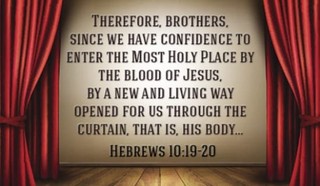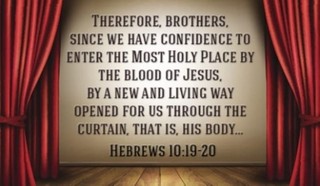- Recent Translations
- All Translations
Yehudim in Moshiach 10:20
Share
Settings
Yehudim in Moshiach 10:20 Meaning and Commentary
By a new and living way
Which is Christ, the God-man and Mediator; who is called the "new" way, not as to contrivance, revelation, or use; for it was contrived before the world was, and was revealed to our first parents, immediately after the fall, and was made use of by all the Old Testament saints; but in distinction to the old way of life, by the covenant of works; and because newly revealed with greater clearness and evidence; see ( Hebrews 10:8 ) and because it is always new, it never will be old, nor otherwise, there never will be another way: some render it, "a new slain way"; because Jesus was but newly slain, and his blood lately shed, by which the way is, and entrance is with boldness: and Christ is a "living way"; in opposition to the dead carcasses of slain beasts, and to the dead and killing letter of the law; Christ gives life to all his people; and all that walk in him, the way, live; and none in this way ever die; it leads to eternal life, and infallibly brings them thither:
which he hath consecrated for us;
either God the Father, and so it intends the designation of Christ to be the way to life and happiness, and the qualification of him for it, by preparing a body, an human nature for him, and anointing it with the Holy Spirit, and the instalment of him into his priestly office, called a consecration, ( Hebrews 10:28 ) or else Christ himself, and so designs his compliance with his Father's will, and his devoting of himself to this service; his preparation of himself to be the way, by the shedding of his blood, and by his entrance into heaven, and by giving a clearer discovery of this way in the Gospel, by which life and immortality are brought to light: and this is
done through the vail, that is to say, his flesh;
the human nature of Christ, through which the way to heaven is opened, renewed, and consecrated, is compared to the vail of the tabernacle, ( Exodus 26:31-33 ) the matter of which that was made, was fine twined linen, which the Jews F25 say was of thread six times doubled; which may denote the holiness of Christ's human nature; the strength, courage, and steadfastness of it, under all its sorrows and sufferings; and the purity and duration of his righteousness; the colours of it were blue, purple, and scarlet, which may signify the sufferings of the human nature; the preciousness of Christ's blood, and the dignity of his person, and his royalty; purple and scarlet being wore by kings: the vail was of cunning work, which may intend the curious workmanship of Christ's human nature, and the graces of the Spirit, with which it is adorned; and it was made with "cherubim", pointing to the ministration of angels, both to Christ, and to his people. The pillars of it may signify the deity of Christ, the support of his human nature, in which it has its personal subsistence; and being of Shittim wood, may denote his eternity: and being covered with gold, his glory: its hooks and sockets may be symbolical of the union of the two natures in him.
F25 Maimon. Cele Hamikdash, c. 8. sect. 14. Jarchi in Exod. xxvi. 1. Kimchi in Sepher Shorash. rad. (rzv) .


